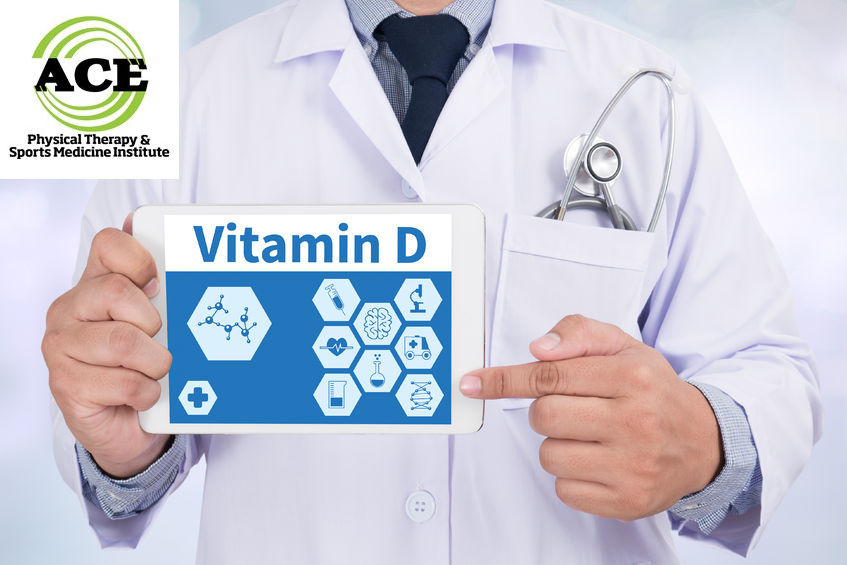IMPORTANCE OF VITAMIN D IN YOUR DIET
 Importance of Vitamin D in Your Diet by ACE Physical Therapy and Sports Medicine Institute
Importance of Vitamin D in Your Diet by ACE Physical Therapy and Sports Medicine Institute
Tid Bits of Info.
- Reports indicate that more than 1 billion people worldwide are vitamin D deficient.
- Vitamin D has been referred to as the “sunshine” vitamin.
- A level of 20 to 50 nanograms/milliliter (ng/mL) is considered adequate for healthy people. Less than 12 ng/mL indicates vitamin D deficiency.
- Vitamin D is fat soluble.
- Vitamin D is produced endogenously when ultraviolet rays from sunlight strike the skin and trigger vitamin D synthesis.
People have always been searching for simple ways to enjoy a full life. From drinking at the “fountain of youth” to taking a “magic” pill, we would love that little something that could transform us into fit, healthy people ready to conquer the world. While the world waits for “magic” pill, the rest of us could take steps toward a healthier life with Vitamin D. It’s not magic but it is sometimes called a little dose of sunshine.
As it turns out, over 1 billion people worldwide are Vitamin D deficient. About 40% of Americans lack adequate levels of Vitamin D. This can be the result of too little sun exposure, diet, obesity, aging and other factors. Increasing Vitamin D levels can impact our health in a variety of positive ways.
Vitamin D is fat-soluble (dissolves in body fat) and has an effect on nearly every aspect of our bodies. It helps bone and muscle health, reduces diabetes, helps with heart function, lowers the chances of certain cancers, helps to reduce inflammation and might have some positive effects on the common cold, healthy births, protection against Parkinson’s Disease and age related mental conditions.
Vitamin D can be manufactured by our bodies with the proper amount of sun light. It is very difficult to find an adequate supply of vitamin D in foods. Fatty fish, organ meats, fortified foods and certain mushrooms are rich in the vitamin. Most people would benefit from a supplement of vitamin D to ensure that their bodies have the proper levels.
BONE HEALTH
Vitamin D helps the bones to absorb the minerals calcium and phosphorus which are needed to maintain strong healthy bones. With a deficiency of vitamin D, there is a higher incidence of bone diseases such as osteopenia and osteoporosis. Some studies indicate that vitamin D levels might have an effect on the healing time of a fractured bone.
MUSCLE STRENGTH
Studies have shown that vitamin D deficiency can lead to a decrease in muscle strength. These studies indicated that the deficiency leads to an increase in muscle atrophy and more specifically the Type II fibers which are responsible for speed and power.
DIABETES
There are two types of diabetes, Type I and Type II. Type I is caused due to genetics and Type II develops later in life most commonly due to lifestyle. There are studies that have shown those infants that have taken a vitamin D supplement can be up to 88% less likely to be diagnosed with the Type I diabetes. One function of vitamin D might be to make a person more insulin sensitive. Type II diabetes develops when the pancreas stops producing insulin or when the body becomes resistant to insulin. Increased sensitivity to insulin would help prevent the onset and development of Type II diabetes.
HEART HEALTH
The studies have shown that men with vitamin D deficiency can be 2x more likely to suffer a heart attack and up to 153% more susceptible to developing heart disease. Maintaining sufficient vitamin D levels can be accomplished via good lifestyle choices and proper nutrition.
Vitamin D levels appear to have an effect on nearly all aspects of the human body and the way it functions. The proper levels are difficult to maintain due to few food choices that can help supply the vitamin to the body and a push to have people avoid excess amounts of sun light. Vitamin D levels are below the recommended levels in many people. Research will have to continue to determine if vitamin D is the “magic” pill.
Read more articles on our main website blog at: ACE-pt.org/blog
Vist our main website at www.ACE-pt.org

